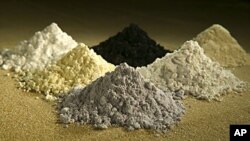China says reports that it has reduced quotas of rare earth exports by 30 percent "false and groundless." A Ministry of Commerce official told the official Xinhua news agency that "China will continue to supply rare earths to the world." The original report of the quota reduction appeared in the Beijing based China Daily newspaper.
Rare earth materials are necessary for the production of evolving technologies, like wind turbines, batteries for electric cars, iPods, cell phones, computer hard drives and many high tech weapons used by the US military.
Jack Lifton is the co-founder and director of Technology Metals Research and an independent consultant and commentator focusing on the future end use trends of rare earth material. He says the problem for many nations, especially Japan, is that China is the only country in the world that mines these rare earth materials.
Is it true that the Chinese have made no secret of their intentions on exporting rare earths?
The Chinese have been telling us for the last two decades that they do not wish to be a rare earths exporter indefinitely. And since at least the beginning of the 21st century, ten years ago, the Chinese has been each year reducing their export of rare earths as raw materials which others can add value to and make finished goods. Because China's stated goal - it has never been a secret - is to create as many jobs in China as possible and add as much value in China as possible to everything they are involved with. In the cases where they are the rare earths producers, they would like to add as much Chinese labor and technology as possible, so that these things wind up as components of finished goods where they make the most money possible, therefore they have employed as many people as possible in the transformation of these raw materials to finished goods. That is what this is all about.
The largest importer of these rare earth materials is Japan which has been basically battling with China over this value-added issue for a decade now. Japan does not wish to give its industrial technology of manufacturing high tech magnets or batteries to China.
What would Japan do?
Japan does not produce any rare earths. In fact, nobody today in the world does essentially except China. So the Japanese at the moment have six projects going around the world to develop rare earths mines, the outputs of which and the concentrates from which will be sent to Japan for processing. There is also a mine well under development in Australia by an Australia-owned company and there is one in California by an America-owned company. The problem of all of these is that we will have at least two years before any of these companies can produce a product that the Japanese can process into an end product they can use. So the Chinese have leverage now for two more years, and they dominate this area. The idea of having a law case or a discussion in the U.S. Congress is just foolishness. The Chinese have the upper hand here. And I think the Wall Street Journal the other day was absolutely right - the way to resolve this is to resolve with the Chinese, in the short term. In the long term, we will have other production around the world and this crisis will go away.
How do you theorize that it should be solved with the Chinese?
I actually do not know, but I don't think the Chinese are not going to give in on this. The problem we are going to have is that while those products are made in Japan using Chinese raw materials, we may have a problem because the Japanese have a problem. I don't know what the outcome is going to be. This is something that we anticipated a decade ago, I have been talking about this for over 10 years about what we are going to do. "Oh, they (the Chinese) will never learn how to do this stuff, and they will always need us to process that stuff." All of that is no longer true.




